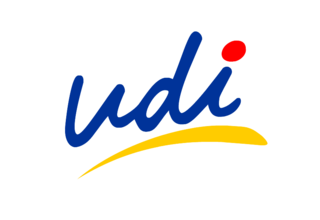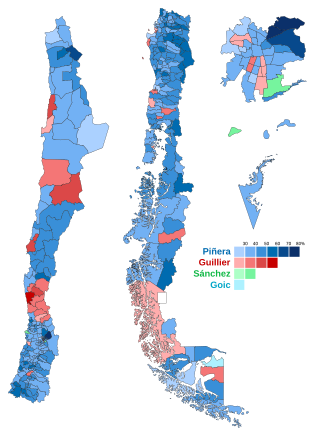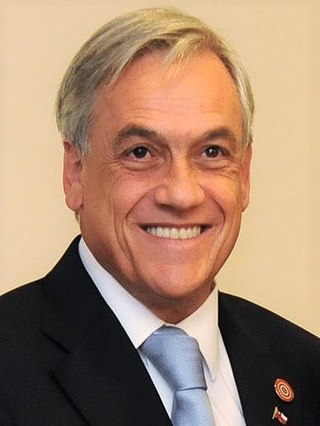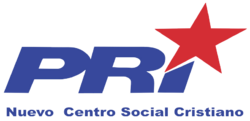
The Christian Democratic Party is a Christian democratic political party in Chile. There have been three Christian Democrat presidents in the past, Eduardo Frei Ruiz-Tagle, Patricio Aylwin, and Eduardo Frei Montalva.

The Independent Democratic Union is a conservative and right-wing political party in Chile, founded in 1983. Its founder was the lawyer, politician and law professor Jaime Guzmán, a civilian allied with Augusto Pinochet. Guzmán was a senator from 1990 until his murder by communist guerrillas on April 1, 1991.

The Concertación, officially the Concertación de Partidos por la Democracia, was a coalition of center-left political parties in Chile, founded in 1988. Presidential candidates under its banner won every election from when military rule ended in 1990 until the conservative candidate Sebastián Piñera won the Chilean presidential election in 2010. In 2013 it was replaced by New Majority coalition.

The Green Ecologist Party was a Chilean political party and one of South America's members of the global green movement.

National Renewal is a liberal conservative political party in Chile. It is a member of Chile Vamos, a centre-right to right-wing coalition. Sebastián Piñera, the former President of Chile, was a member of the party.

General elections were held in Chile on Sunday 13 December 2009 to elect the president, all 120 members of the Chamber of Deputies and 18 of the 38 members of the Senate were up for election. As no presidential candidate received a majority of the vote, a second round was held between the top two candidates—Sebastián Piñera and Eduardo Frei Ruiz-Tagle—on Sunday 17 January 2010. Piñera won the runoff with 52% of the vote and succeeded Michelle Bachelet on 11 March 2010.
Pablo Manuel Galdames Díaz is a Chilean former professional footballer who played as a midfielder. He obtained a total number of 22 caps for the Chile national team, scoring two goals between 1995 and 2001.

The Coalition for Change was a presidential and parliamentary electoral coalition that groups the supporters of Sebastián Piñera for the 2009-10 Chilean presidential election. Its predecessor was the Alliance for Chile. The constituent parties are the Independent Democratic Union, National Renewal, ChileFirst, the movements Grand North, and Christian Humanism.

General elections were held in Chile on 17 November 2013 to elect the president, all 120 members of the Chamber of Deputies, 20 of the 38 members of the Senate and 278 members of regional boards. All elected members would serve a four-year term, aside from the Senators would serve for eight years. All the newly elected authorities began their terms on 11 March 2014.

The Nueva Mayoría, also translated in English as New Majority, was a Chilean centre-left electoral coalition from 2013 to 2018, composed mainly of centre-left political parties supporting the presidential candidacy of Michelle Bachelet in the 2013 election.

General elections were held in Chile on 19 November 2017 to elect the president, all 155 members of the Chamber of Deputies, 23 of the 43 members of the Senate and 278 members of regional boards. All elected members would serve a four-year term, aside from the senators would serve for eight years.

Chile Vamos is a centre-right to right-wing political coalition of three political parties in Chile. The coalition was created on 29 January 2015 by the general secretaries of the Independent Democrat Union (UDI), National Renewal (RN), Democratic Independent Regionalist Party (PRI) and Political Evolution (Evópoli).

The Broad Front was a Chilean political coalition founded in early 2017, composed of left-wing parties and movements. Its first electoral contest was the 2017 Chilean general election, where their presidential candidate Beatriz Sánchez came third with 20% of the vote in the first round of election. The Broad Front also expanded their electoral representation to 20 deputies, 1 senator and 21 out of 278 Regional Councillors, thus consolidating the movement as the 'third force' in Chilean politics.

The Chilean presidential primaries of 2017 were held in Chile on Sunday 2 July 2017. It was the first election in the country's history in which Chileans were permitted to vote from abroad.
The Social Green Regionalist Federation is a Chilean political party.

Democratic Independent Regionalist Party was a Chilean centrist political party. It was formed by the merger of the Independent Regionalist Party (PRI) and the Patagonian Regional Democracy (DRP).

Apruebo Dignidad was a democratic socialist Chilean electoral coalition officially created on 11 January 2021, by the Broad Front and Chile Digno in preparation for the Constitutional Convention election.

Alejandra María Bravo Hidalgo is a Chilean politician, who was active in the Independent Regionalist Party (PRI) until its dissolution in 2018. She served as president of the party between 2015 and 2018.

The Independent Regionalist Agrarian and Social Movement called in some sources as Independent Regionalist Agrarian Green Movement was a Chilean regionalist political party. It was founded in 2015 and was legally recognized by the Electoral Service until April 2017 when it was merged with FREVS and dissolved.

















